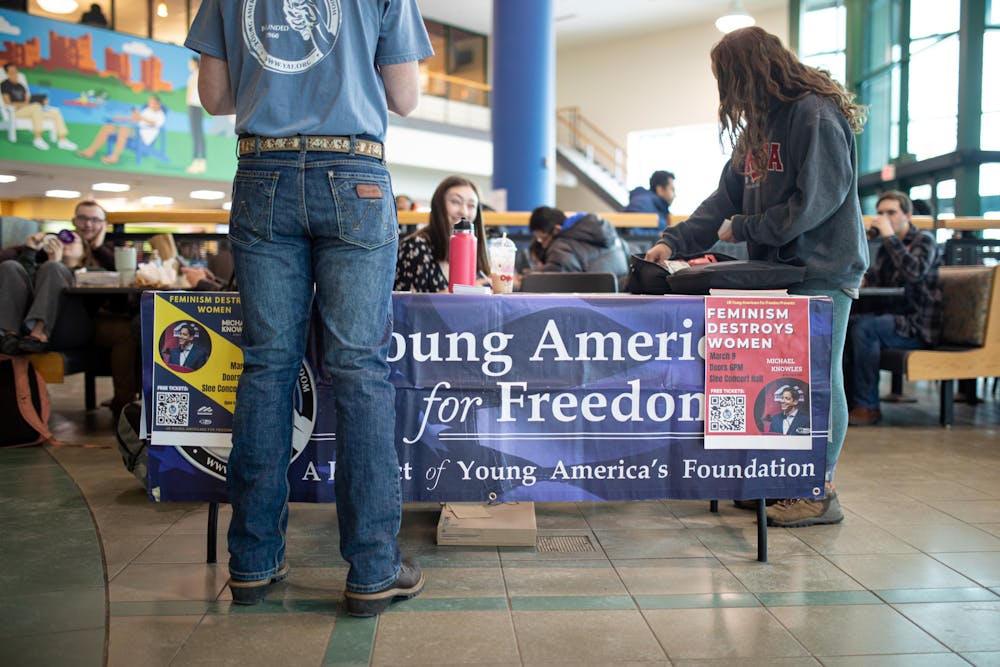In an updated federal lawsuit, the UB chapter of the Young Americans for Freedom (YAF) is suing the UB Student Association (SA) and three UB administrators. The conservative student club is taking legal action in response to SA policies that allegedly infringed on YAF’s constitutional rights to free speech and association.
The lawsuit stems from SA’s controversial policy banning certain clubs, including UB’s YAF chapter, from affiliating with outside organizations like the Young America’s Foundation, which provides funding to thousands of high school and college chapters across the nation. The SA Senate narrowly passed that policy this March, weeks after a YAF-sponsored speech by right-wing commentator Michael Knowles led to a condemnation of "hateful and dehumanizing rhetoric" from UB President Satish Tripathi and large protests.
At the time of the vote, SA President Becky Paul-Odionhin said a ban on outside affiliations would “protect SA” from conflicts with outside organizations’ policies. While SA leaders never referenced YAF by name, Paul-Odionhin told senators, “We all know why we’re doing this.”
The ban drew harsh criticism from other affected clubs, including Islamic Relief, Amnesty International and Circle K. They argued that the policy would disproportionately harm service groups and circulated a petition against the ban that drew over 300 signatures.
The UB chapter of YAF originally sued SA in federal court on June 1, claiming the affiliation ban was designed to discriminate against YAF and that it infringed upon the group’s freedom of speech. Lawyers for YAF moved to temporarily overturn the ban, and on July 6, the SA Executive Committee repealed the ban, replacing it with a new “Acknowledgement of Club Officer Responsibilities.” That document lists certain requirements that club officers must agree to before taking office, including that “no SA club may be a separate legal entity from SA.”
“Policies like the [one the] Student Association passed, which ban someone from having an affiliation with a national organization — that’s blatantly unconstitutional, and there should be policies in place at the university level that prevent that type of discrimination from taking place in the first place,” said Caleb Dalton, an attorney representing YAF’s UB chapter in the case and a senior counsel with the Alliance Defending Freedom (ADF).
Despite the rule change, YAF amended its suit in late July, claiming that a long-standing SA bylaw prohibiting clubs from being independent legal entities or taking legal actions is unconstitutional and alleging that SA has exhibited bias against YAF because of its conservative political viewpoint.
“We believe the latest version of the lawsuit against the UB Student Association — like the previous one — is without legal merit, and is instead cynically designed to generate headlines and attention instead of protecting the rights of students,” SA attorney Aaron Saykin said in an email.
YAF’s lawyer, Dalton, primarily works on cases involving higher education. He said most student governments allow clubs to handle their own contracts. He said YAF’s difficulty obtaining a contract through SA for Michael Knowles’ speech was tantamount to an obstacle on the club’s freedom of speech.
Dalton also asserts that by giving SA “unbridled discretion” to make such rules, UB administrators neglected their duty to protect students’ rights, an allegation rejected by UB administrators.
“We have yet to go through discovery and see how other contracts have been handled, but whether that’s through mismanagement or through malfeasance, neither one is acceptable,” Dalton said.
“SA is a separate, self-governing non-profit organization, led by elected student leaders who serve and represent undergraduate students at the university,” UB spokesperson John Della Contrada said in an email. “Elected student leaders develop and establish SA policies independent of the university.”
Dalton said that regardless of UB’s claims, the university has a responsibility to prevent SA from violating students’ rights.
“The university itself is the one who owns all the fora which students are getting access to by being student organizations,” Dalton said. “It’s the university’s classrooms, the university’s facility space, which are being regulated by the Student Association. The university can’t absolve itself from First Amendment responsibility by simply saying, ‘Oh, we delegated that to the Student Association.’”
ADF is a conservative Christian legal group that is representing YAF in the case. ADF describes itself as “the world’s largest legal organization committed to protecting religious freedom, free speech, marriage and family, parental rights, and the sanctity of life” and is labeled a hate group by the Southern Poverty Law Center.
ADF has represented YAF chapters in other lawsuits against universities, including an unsuccessful lawsuit against the University of Minnesota and an ongoing suit against SUNY Binghamton.
Sol Hauser is a news editor and can be reached at sol.hauser@ubspectrum.com





